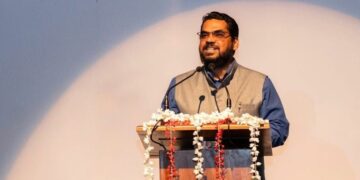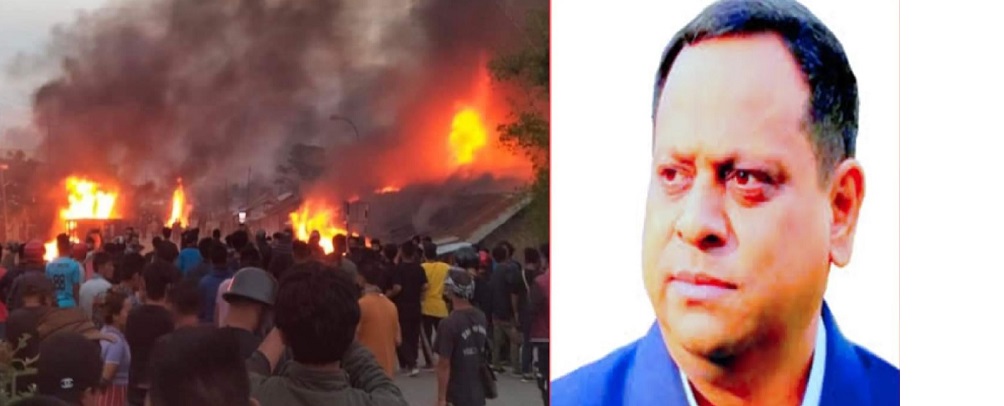Violence in Manipur has been protracted and devastating. Looting, arson, sexual assault including gang rapes of women, and cold-blooded murders are alarming and destructive. Jonathan Roy Tariang of Northeast News spoke to internationally acclaimed conflict theorist and best-selling author Jaideep Saikia on the recent events in Manipur. Excerpts:
Jonathan Roy Tariang: Sir, Over three months have passed since violence erupted in Manipur. What is your prognosis at this point?
Jaideep Saikia: The manner in which the atmospherics are playing out in Manipur is getting curiouser and curiouser. What started out as ethnic conflict over land and possible grant of ST status to the Meiteis has graduated into full-fledged politically motivated pogroms. The geographical divide and “cultural apartheid” has snowballed into an unprecedented civil strife, the wounds of which will take a long time to heal.
However, the Prime Minister’s call from the ramparts of Red Fort on 15 August 2023 that peace would be restored has showcased considerable confidence. I hope all would be well soon.
JRT: What was the genesis of the Kuki-Meitei clash?
JS: On the face of it the primary motivation for the violence at present is political, perhaps even driven and egged on by nefarious forces that were attempting to demonise a milieu that had—despite deep fissures—no history of cultural divide let alone religious colour. I mean there was a modicum of “us and them” between the various communities in Manipur, but co-existence was tolerated. Today an alien agenda—bent on importing superimposition of the devious kind—has opened up old wounds that had been buried for over a hundred years. Hostility of a vicious kind has come to the fore. Unfortunately this time the battle lines that have been drawn up are on very palpable lines and it would take the peacemakers a great amount of resolve for the proverbial “peace pipe” to be made to be smoked. Moreover there is accentuated ego with each side refusing to patch up.
JRT: Why is the Assam Rifles being pilloried?
JS: The Assam Rifles—led by the Indian army—is a noble force and I cannot fathom that they are capable of doing anything that may be considered “out of line” in Manipur and Nagaland. I have had the good fortune of having patrolled with the force in Tirap and Changlang, in places such as Manabum Reserve Forest, have gone out with the forces’ bravehearts in Ukhrul, all the way to Muivah’s home village, Somdal. Indeed, I have never in the last quarter of a century witnessed deliberate indiscretion in the force. Occasional aberrations might have happened, but the Riflemen and the Indian army officers who command the force have showcased exemplary behaviour.
JRT: But what is the reason for the vilification of the Assam Rifles?
JS: The incident occurred in Manipur when the Assam Rifles was attempting to establish a “Buffer Zone” between the warring parties in the Qutubwali Masjid and Pholijang track junction on Kwakta-Pholijang Road. It is being reported that they were trying to block and prevent movement of terrorists and miscreants who have been taking law into their own hands. However, the incident witnessed an ugly face-off between the Manipur State Commandos and the Assam Rifles.
Matters came to a head when there was reportedly firing by the Manipur State Commandos onto the Assam Rifles who (it has been verified) were simply carrying out their duty as per the directions of the CHQ. It should be noted that only the CAPF, the Indian Army and the Assam Rifles are required to be in the Buffer Zone.
The hilarity of the times was greatly in evidence when the Manipur state police filed an FIR against the Assam Rifles.
JRT: Isn’t it strange that security forces battling the miscreants should be at such loggerheads?
JS: It has happened before in the North East. The Assam Police and the police forces of Nagaland and Mizoram have clashed in the past in inter-state borders. But when there is such grave crises at hand, it should be the bounden duty (primarily of the state police) to take the lead alongside the paramilitary forces and the Indian army and try to usher in peace. One fears that the Manipur state police could have become politicised since 3 May 2023. This may have led them to take a decidedly partisan stance.
It is this predicament that must array the sweaty brows of the policy makers in New Delhi in the coming days.
JRT: Should not the military leadership step in to fire fight the odds and restore normalcy?
JS: The Indian army leadership of the Eastern Command and certainly the military and Assam Rifles in Manipur and Nagaland have proven themselves not only as a non-partisan force, but constituents which have traversed great odds in the face of difficulty. I am certain that there are robust moves on to salvage the situation. A sensitive state such as Manipur cannot be left to such reprehensible device.
Incidentally, the Assam Rifles’ history since 1835—when it was first formed as the “Cachar Levy”—is not in doubt. The officer cadre from the Indian army that guides it from Ft. William, Rangapahar, Imphal and Kohima are an extremely committed lot, and they maintain very high standard of professionalism.
JRT: The standoff between the Assam Rifles and the Manipur Commandos is unfortunate. How do you see such an imbroglio panning out?
JS: The manner in which the unavoidable fracas between the Manipur Commandos (that some among many are terming as being “politically” motivated) and the Assam Rifles does not augur well for India’s national security and certainly the fragile garrisoned state of Manipur.
But as I said I can assure you that the Indian army leadership of the Eastern Command must be doing everything in his power, and we would see a happy ending. I am also confident that with such officers in the helm of affairs all will be well.
However, as a parting shot I must say that I am of the firm opinion (especially as I have seen both the Indian army and the Assam Rifles rather close up) that the North East and Manipur cannot afford to do without the brave “Sentinels” that have been tirelessly guarding the eastern extremities of India. The nation has only reasons to be grateful to such selfless men.















